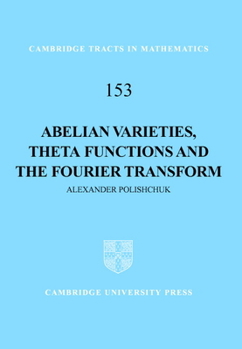Abelian Varieties, Theta Functions and the Fourier Transform
(Book #153 in the Cambridge Tracts in Mathematics Series)
The aim of this book is to present a modern treatment of the theory of theta functions in the context of algebraic geometry. The novelty of its approach lies in the systematic use of the Fourier-Mukai transform. The author starts by discussing the classical theory of theta functions from the point of view of the representation theory of the Heisenberg group (in which the usual Fourier transform plays the prominent role). He then shows that in the...
Format:Hardcover
Language:English
ISBN:0521808049
ISBN13:9780521808040
Release Date:April 2003
Publisher:Cambridge University Press
Length:308 Pages
Weight:1.37 lbs.
Dimensions:0.8" x 6.0" x 9.0"
Customer Reviews
0 rating





